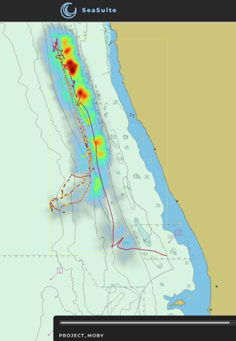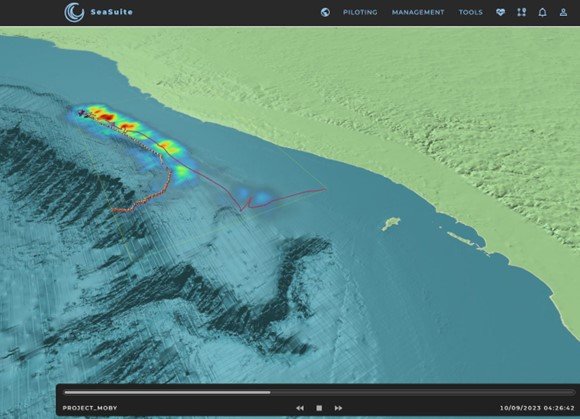BO-MTS AUVs, JASCO Applied Sciences and Ocius Bluebottle USVs demonstrate cutting-edge real-time acoustic marine-mammal monitoring
PRESS RELEASE
September 2023. Blue Ocean Marine Tech Systems (BO-MTS), JASCO Applied Sciences Australia and Ocius Technology combined to demonstrate near real-time detection, classification, and tracking of marine mammals using autonomous underwater vehicles (AUVs) and uncrewed surface vessels (USVs) off the coast of Western Australia. The seven-day demonstration focused on detecting humpback whales during their southern migration.
Figure 1. BO-MTS Slocum Glider fitted with JASCO OceanObserverTM and four-hydrophone spatial array.
Figure 2. Ocius Bluebottle USV fitted with JASCO OceanObserverTM and nine-channel hydrophone array.
JASCO’s high-performance passive acoustic data acquisition and processing system, the OceanObserverTM, capable of on-board, in-situ signal processing, was integrated into a BO-MTS glider and the Ocius Bluebottle USV. Near real-time whale detections were transmitted via Iridium satellite-communications link enabling verification and validation by Jasco’s acoustic analysts.
BO-MTS deployed three Slocum glider AUVs, one equipped with a JASCO OceanObserverTM with a four-hydrophone spatial array, and two others, each with a JASCO AMAR G4 systems utilising a single hydrophone. The ultra-efficient, buoyancy-propelled gliders were optimised for acoustic performance by BO-MTS to minimise self-noise and maximise the quality of the acoustic data collected. The data set, captured ambient noise, CTD data and the marine-mammal detections was transmitted via Iridium satellite each time the gliders surfaced.
Ocius provided their 100% renewable-energy USV, the Bluebottle, which was equipped with a JASCO OceanObserverTM and a low-frequency nine-channel towed array. The array was mounted onto the Bluebottle's keel winch, providing the ability to stow it during adverse weather conditions and transit periods.
All the data from the gliders and the Bluebottle was integrated into BO-MTS' new visualisation software, SeaSuite™, where it was fused to provide meaningful real-time displays of the vehicle locations and both unconfirmed and confirmed marine-mammal vocalisations.
Figure 3. BO-MTS SeaSuite™ software showing real-time detection, localisation, ranging and tracking.
Figures 4 & 5. Examples of heat maps of whale locations from detections by the vehicles. Displayed on SeaViz™ using electronic charts (left) and 3D visualisation (right).
Over the course of the seven-day mission, the combined efforts of these platforms successfully detected over half a million individual vocalisations. A large number of these acoustic recordings were classified and localised in near real-time by Jasco analysts ashore. This demonstration highlighted the feasibility of remotely accessing and controlling these vehicles, as well as the cost-effectiveness of logistics and piloting. Furthermore, it demonstrated the technology readiness of the systems, with seamless marine-mammal detection and classification, from these innovative platforms.
Figure 6. Spectrogram of humpback whale vocalizations collected during the demonstration.
“These buoyancy-propelled, long-endurance Autonomous Underwater Vehicles are ideally suited to this type of work, as they can remain at sea whatever the weather for extended periods, gathering high-quality acoustic data across a wide frequency band whilst they silently glide beneath the surface. The unique properties of an underwater glider make it perfect for persistent, cost-effective deployment using very little energy.”
This collaborative effort holds particular significance for several sectors who may wish to identify the presence of marine mammals, including offshore renewables, oil/gas, fisheries, tourism and scientific research. Traditionally, monitoring marine mammals that could be affected by activities such as piling, seismic survey, UXO disposal and more general vessel operations has relied on the presence of certified Marine Mammal Observers on board ships or aircraft. These unmanned solutions represent a step change in this approach, complementing and in many cases addressing the limitations associated with traditional MMOs.
BO-MTS’ experience in the field of AUVs, combined with JASCO’s understanding of underwater-acoustics and Ocius’ Bluebottle USVs, offers a more-efficient, cost-effective, low-carbon and environmentally friendly alternative to traditional acoustic methods. Effective acoustic monitoring can now be conducted from shore-based locations, reducing health and safety risks significantly.
For more information, contact BO-MTS at info@blueoceanmts.com or +61 (8) 6102 2999.






